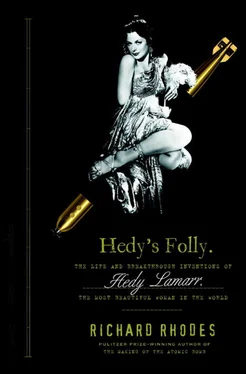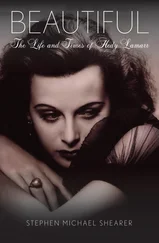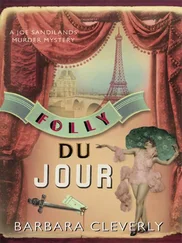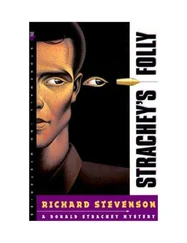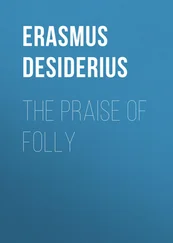Eventually, she revealed another reason she had insisted on traveling unaccompanied: “I went to Prague because I was in love with somebody.” She wanted no chaperoning mother to interfere.
Hedy’s performance as Eva in Ekstase would both promote and plague her professional career. Although the film includes a brief nude scene, it’s guileless rather than salacious. A young wife, Eva, languishes in an unconsummated marriage to a fussy middle-aged man. Frustrated, she leaves him. Out riding one morning, enjoying her new freedom, she stops to swim in a woodland pond, parking her summer playsuit on the back of her unsaddled mare. While she’s swimming, her mare runs away, attracted to a stallion in the next pasture. Adam, a handsome engineer on a road construction crew, stripped to the waist and a-sweat, catches the runaway and goes looking for its rider. He finds Eva hiding behind a bush and tosses her playsuit to her. Dressed, disdainfully retrieving her horse, she trips and sprains her ankle. He splints it, necessarily handling her leg, and she slaps him for his familiarity. Back home, she realizes she’s drawn to him, struggles with her feelings, finally looks him up in his construction cabin and initiates a night of passion. Afterward the lovers happily plan another night together at a hotel.
The next day they go into town separately to avoid scandal. Adam catches a ride unknowingly with Eva’s husband, Emile, who recognizes as his estranged wife’s a necklace Adam is fondling. Both men check into the same hotel. The engineer hires musicians to serenade Eva as they drink champagne and dance on the hotel terrace. Emile in his room overhead hears the music and agonizes. There’s a shot. The hotel staff crowds around the door to Emile’s room. Adam breaks in: Emile has killed himself, his fussy pince-nez lying broken on the floor. Adam and Eva go to the station to wait for the next train to Berlin. He falls asleep. She decides to return home and leaves him sleeping—their night of passion was a deliverance but not an obligation.
In this simple and largely pantomimed story, only three brief scenes challenge what would otherwise be at most a PG-13 rating today: a glimpse of Eva’s breasts as she swims nude, a long shot of her running nude through the woods, and a gauzy close-up of her face in passion during the couple’s night of lovemaking. Not nudity but blatant Freudian symbolism communicates the film’s sexual themes: a jackhammer drilling, a bee pollinating a flower, a stallion rearing and snorting before servicing a mare off camera. More challenging than nudity or symbolism to the sexual canons of the day, in America in particular, was the story itself, which reversed the prevailing Victorian paternalism. Eva falls for Adam, seeks him out, seduces him, takes her pleasure, and drops him when she’s done, while Emile, when he realizes he isn’t vital enough for her, obligingly shoots himself. Had the film been released in the 1960s instead of the 1930s, it might have been hailed as feminist.
Certainly Ekstase embodied the new spirit of personal freedom which Zweig observed of that time and place. “The world began to take itself more youthfully,” he writes, “and, in contrast to the world of my parents, was proud of being young…. To be young and fresh, and to get rid of pompous dignity, was the watchword of the day. The women threw off the corsets which had confined their breasts, and abjured parasols and veils since they no longer feared air and sunshine. They shortened their skirts so that they could use their legs freely at tennis, and were no longer bashful about displaying them if they were pretty ones. Fashions became more natural; men wore breeches, women dared to ride astride, and people no longer covered up and hid themselves from one another.”
Ekstase illustrates these changes both in situation and in costume. It also dramatizes the corresponding changes in values that Zweig observed:
This health and self-confidence of the generation that succeeded mine won for itself freedom in modes and manners as well. For the first time girls were seen without governesses on excursions with their young friends, or participating in sports in frank, self-assured comradeship; they were no longer timid or prudish, they knew what they wanted and what they did not want. Freed from the anxious control of their parents, earning their own livelihood as secretaries or office workers, they seized the right to live their own lives. Prostitution, the only love institution which the old world sanctioned, declined markedly, for because of this newer and healthier freedom all manner of false modesty had become old-fashioned. In the swimming-places the wooden fences which had inexorably separated the women’s section from the men’s were torn down, and men and women were no longer ashamed to show how they were built. More freedom, more frankness, more spontaneity had been regained in these ten years [after the turn of the century] than in the previous hundred years.
As if confirming Zweig’s insight, Hedy announced during the production of Ekstase that she had been offered a Hollywood contract and had turned it down. “I don’t want to become the slave of film,” she told an Austrian magazine grandly, “but rather want to make films or take breaks when I feel like it.”
After filming Ekstase , she returned to Vienna. In November she celebrated her eighteenth birthday. She was ill with influenza and lost weight, enhancing her already striking beauty. When she recovered, she nearly won the role of Caroline Esterhazy, the young Hungarian countess whom Franz Schubert tutored and loved, in the film Unfinished Symphony . She was reluctantly passed over because the role required someone who could sing Schubert art songs and she was not a trained singer.
Ekstase premiered in Prague on 20 January 1933. At that distance it was relatively painless. A month later, its Vienna premiere simultaneously in four theaters drew large crowds—more than seventy thousand tickets sold in its first two weeks. Hedy prepared her parents for the experience by warning them that the film was “artistic,” but nothing prepared them for seeing their daughter nude or apparently having sex. “I wanted to run and hide,” she remembered. “My father solved the predicament. He simply rose and said grimly, ‘We will go.’ I gathered my belongings in one grab. My mother seemed angry, but somehow reluctant to walk out. Nevertheless, walk out we did.”
“My mother and father suffered about it,” Hedy acknowledged. “My father suffered even more than my mother, I think. It was the hurt look in his eyes that made me realize to the full how silly and ill-advised I had been.” They were told, she said, that they should “do something” about it, “that I was a minor and that the company had no right to ask such a thing of me…. But my father felt, and rightly, that to make a fuss about it would only attract more publicity to it.” She made him understand, she said, how when you’re young you’re “apt to do foolish things in an effort to appear experienced and of the world. And so, because they loved me very dearly, they did not speak of it any more.”
Publicity scandals that feel like the end of the world usually aren’t. Fritz Kreisler, the violinist and composer, had written a musical comedy about what Time magazine would describe as “the courtship of the young Emperor Franz Josef and Elizabeth, 16-year-old, harum-scarum daughter of Bavaria’s Duke Max.” Elizabeth’s nickname was Sissy; she was, Time explained, “the favorite of her father who roved the forests with woodcutter friends, played the zither, behaved more like a peasant than a duke.” Sissy had opened in Vienna’s Theater an der Wien just at Christmas 1932; it would continue through hundreds of performances. Musical comedy didn’t require the classically trained singing voice that Schubert lieder did. Hedy understudied the role of Sissy beginning in early January 1933 and took over the lead in late March. “At first I felt reluctant about it,” she remembered. “I said to myself, ‘How will they accept me as the Austrian Queen after this ‘Ecstasy’? But the [theater] prevailed upon me and of course I really wanted to.” The audience welcomed her, as did a reviewer: “She looks wonderful, tender and really attractive. And she performs with real charm too: simply without affectation, talking and singing with the high voice of a child…. In short, a delightful Sissy, without the stardom and pomp of a sophisticate, but with easy, childlike tones.”
Читать дальше
